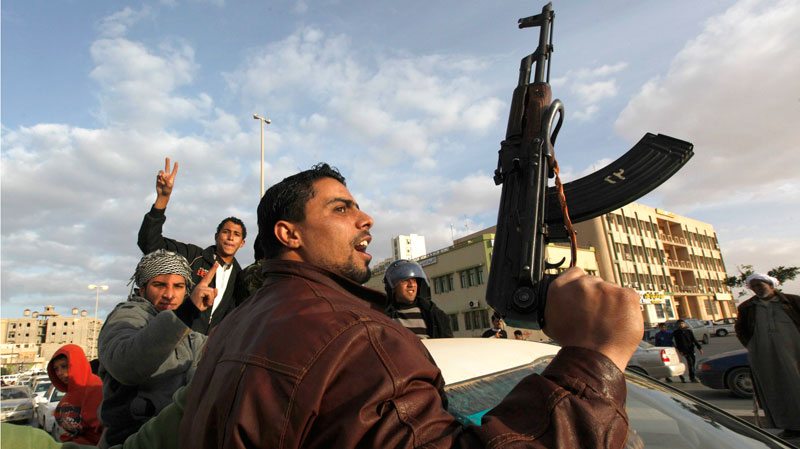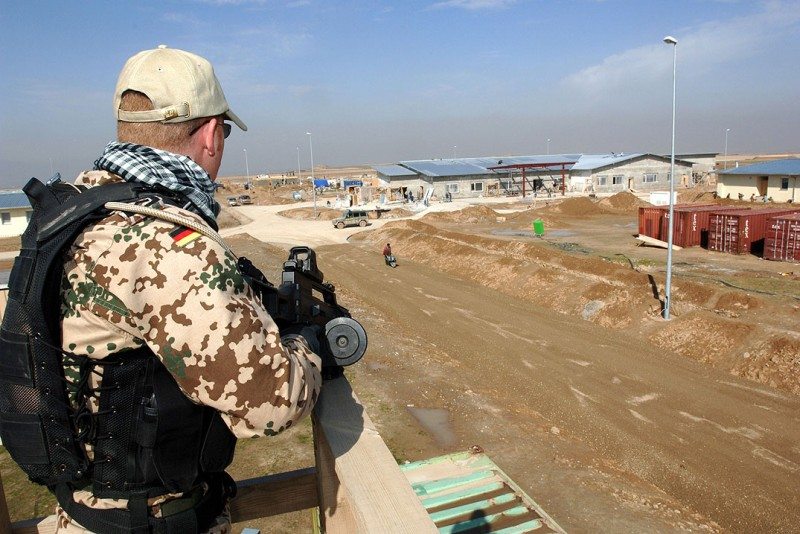Libyan rebels retreated from another key town under heavy shelling from government forces as Moamer Kadhafi loyalists swept closer towards the main opposition-held city of Benghazi.
But following the fall of Brega, the commander of the vastly outgunned rebels, Kadhafi’s former interior minister, vowed to defend the next town in the path of Kadhafi’s forces, Ajdabiya.
A lightning counter-offensive over the past week has pushed the rebels out of Mediterranean coastal towns, allowing the regime to wrest back the momentum against the month-long uprising against Kadhafi’s four-decade grip on power.
Kadhafi’s forces are “marching to cleanse the country” of insurgents, Libyan army spokesman Colonel Milad Hussein told reporters in Tripoli.
“Our raids are forcing the terrorists to flee. We have liberated Zawiyah, Uqayla, Ras Lanuf and Brega, and the army is advancing to liberate the rest of the regions.”
France said it would speed up its push for a no-fly zone to ground Kadhafi’s warplanes, something the rebels on the ground have been calling for.
Dozens of rebels fled east out of Brega towards Ajdabiya, the last rebel-held town before Benghazi which the Libyan opposition has made its de facto capital just 100 miles (170 kilometres) away.
Libyan state television declared Brega “purged of the armed gangs.”
It also reported that Kadhafi had met the ambassadors of China, India and Russia to discuss the possibility of handing them control of the country’s oil exports.
China and Russia, both permanent members of the United Nations Security Council, have expressed scepticism about the need for a no-fly zone in Libya. India, a temporary Security Council member, has come out against the idea.
National Oil Corp had called its employees to return to work and called on foreign companies to send in their tankers, state television reported.
Oil giant Total said on Friday that the unrest had slashed Libya’s output by 1.4 million barrels a day to under 300,000. Libya’s largest market is Europe.
General Abdel Fatah Yunis, who resigned as Kadhafi’s interior minister soon after the rebellion began in mid-February, vowed to defend Ajdabiya.
“Ajdabiya is a vital city,” he told reporters in Benghazi.
“It’s on the route to the east, to Benghazi and to Tobruk and also to the south. Ajdabiya’s defence is very important… We will defend it.”
From Ajdabiya there is a straight desert road to the oil port of Tobruk, which to date has given rebels full control over the east up to the Egyptian border.
It is a vital transit route for supplies from abroad.
The rebel withdrawal of a few kilometres was tactical given the semi-desert terrain, Yunis argued: for if Kadhafi’s army pursued them, they would be over-stretched.
“We feel he (Kadhafi) will have serious logistical problems and serious difficulties for supplying his troops, because they’re getting extended all the time.”
But among the rebel forces only the defectors from Kadhafi’s army have military experience: they have few heavy weapons and are vulnerable to air attack.
The International Committee of the Red Cross said it had shipped seven truckloads of food and medicine to Benghazi, where the streets were largely deserted Sunday around the rebels’ headquarters in the courthouse.
“The euphoria is over. We are frightened of what’s coming, frightened of getting blown up,” said retired civil servant Mohammed Gepsi.
Doctors Without Borders (MSF) warned that rebels were being denied medical help in government-held areas and called for access to treatment for the wounded.
“In several conflict zones, such as Zawiyah and Misrata, large numbers of people are cut off from any external assistance, while critical medical needs and shortages of medicine and materials are reported,” it said.
Zawiyah, just west of the capital, fell to Kadhafi’s forces on Friday after bitter fighting.
In Misrata, a city east of Tripoli which continues to hold out against attacks that last week killed at least 21 people, residents reported renewed firing on Sunday.
The US-based Human Rights Watch said Libyan security forces had unleashed a wave of arbitrary arrests in Tripoli, “brutally suppressing all opposition.”
Senior al-Qaeda militant Abu Yahya al-Libi, himself a Libyan, warned of the heavy price of a rebel defeat in a videotape posted on jihadist websites on Sunday.
Libyan insurgents “must carry on with their revolution, without hesitation or fear, in order to push Kadhafi into the abyss,” said Libi, considered one of Al-Qaeda’s top ideologues.
Kadhafi has repeatedly charged that Al-Qaeda was behind the uprising.
Rebel morale was boosted by an Arab League decision on Saturday to support a
no-fly zone over Libya and to make contact with the insurgents’ national council in Benghazi.
The White House welcomed the Arab League decision, but stopped short of giving full support for the no-fly zone, which Britain and France have been backing.
US Secretary of State Hillary Clinton is due in Paris Monday to meet her G8 counterparts and hold talks with Mahmud Jibril, a top member of the national council, representing Libya’s opposition movement.
Clinton has said a plan for a no-fly zone would be presented to NATO on Tuesday.











